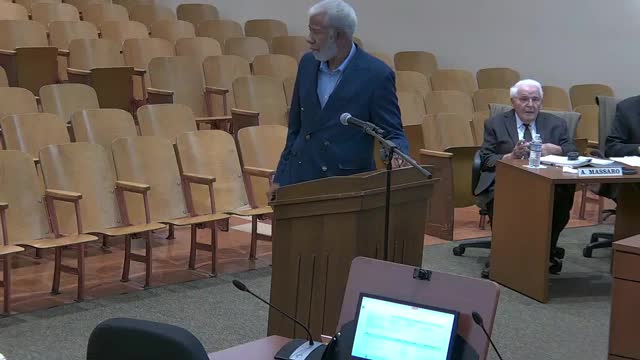Reverend Copeland tells Niagara Falls board Project WIP reports high pass rates, student testimonials on mental-health impact
October 10, 2025 | NIAGARA FALLS CITY SCHOOL DISTRICT, School Districts, New York
This article was created by AI summarizing key points discussed. AI makes mistakes, so for full details and context, please refer to the video of the full meeting. Please report any errors so we can fix them. Report an error »

Niagara Falls — At an Oct. 9 Board of Education review session, Reverend Copeland presented Project WIP ("Wisdom in Troubled Times"), a school-based program he described as focused on "intrinsic motivation" and on teaching students positive self-talk. Copeland read letters from participating students and presented program data he said show most participating students advanced to the next grade without summer school.
Copeland said the program emphasizes repeated affirmations — a practice he called "Speak Life Twice" — and described classroom exercises and ‘‘power words’’ staff use with students. "We create an atmosphere where they are celebrated, not tolerated," Copeland said as he read excerpts from student feedback, some of which said the program helped them stop suicidal thinking and improved mental health.
Copeland presented numeric results he said were collected during the program's third year. He told the board that at Gaskill Preparatory School, of 82 participating seventh- and eighth-grade students roughly 90% did not have to attend summer school; at LaSalle, of 106 participating students he said about 97% advanced to the next grade without summer remediation. Copeland attributed those figures to the program when speaking to the board, and noted principals and teachers have asked him to offer professional development for staff to show the techniques used with students.
School social worker "Miss Warren" and student board member Harjot Kour both responded during the meeting. Miss Warren described classroom breakthroughs she said she observed when Project WIP staff worked with high‑need groups: "They did, like, such amazing, like, breakthrough with these kids," she said. Harjot Kour said the program's materials and approach appeared helpful and asked how students are selected and recruited; Copeland and other presenters said participation is arranged in coordination with principals and staff at each school.
Parent Lauren Carey, who identified herself as both a former student and currently a parent in the district, thanked Copeland and said district staff addressed earlier concerns she raised. The board president and other members praised the presentation and said programs like Project WIP illustrate how community partners are used in district schools.
The district did not take a formal vote on expansion or funding of the program during the review session. Copeland said the program currently operates in multiple schools in the district and that staff and principals have expressed interest in expanding professional-development sessions for teachers.
Board members and staff asked follow-up questions and expressed appreciation; no formal action was recorded on Oct. 9 to adopt or fund new programming beyond remarks at the review session.
Copeland said the program emphasizes repeated affirmations — a practice he called "Speak Life Twice" — and described classroom exercises and ‘‘power words’’ staff use with students. "We create an atmosphere where they are celebrated, not tolerated," Copeland said as he read excerpts from student feedback, some of which said the program helped them stop suicidal thinking and improved mental health.
Copeland presented numeric results he said were collected during the program's third year. He told the board that at Gaskill Preparatory School, of 82 participating seventh- and eighth-grade students roughly 90% did not have to attend summer school; at LaSalle, of 106 participating students he said about 97% advanced to the next grade without summer remediation. Copeland attributed those figures to the program when speaking to the board, and noted principals and teachers have asked him to offer professional development for staff to show the techniques used with students.
School social worker "Miss Warren" and student board member Harjot Kour both responded during the meeting. Miss Warren described classroom breakthroughs she said she observed when Project WIP staff worked with high‑need groups: "They did, like, such amazing, like, breakthrough with these kids," she said. Harjot Kour said the program's materials and approach appeared helpful and asked how students are selected and recruited; Copeland and other presenters said participation is arranged in coordination with principals and staff at each school.
Parent Lauren Carey, who identified herself as both a former student and currently a parent in the district, thanked Copeland and said district staff addressed earlier concerns she raised. The board president and other members praised the presentation and said programs like Project WIP illustrate how community partners are used in district schools.
The district did not take a formal vote on expansion or funding of the program during the review session. Copeland said the program currently operates in multiple schools in the district and that staff and principals have expressed interest in expanding professional-development sessions for teachers.
Board members and staff asked follow-up questions and expressed appreciation; no formal action was recorded on Oct. 9 to adopt or fund new programming beyond remarks at the review session.
View full meeting
This article is based on a recent meeting—watch the full video and explore the complete transcript for deeper insights into the discussion.
View full meeting
